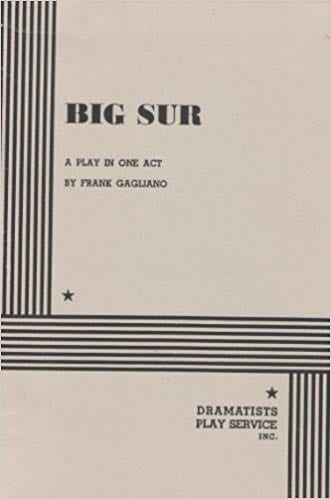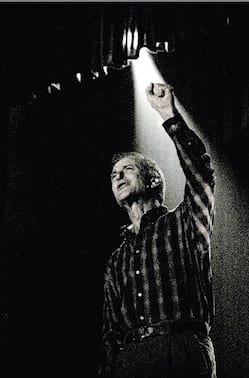
BIG SUR
Forty-Five year old church organist Jeremy Chester, having won a car in the church raffle (“the first thing I ever won in my life”), decides to take to the road and head west. ”–Straight across this great country I’ve never seen”
JEREMY: . . . In the past few years I’ve become itchy. Have wanted
to talk to people–not past them. Open up to them–have them open up to me. Have wanted to start a–and this is one of my favorite words–”dialogue.” Isn’t that beautiful? . . . “Dialogue.” . . . –And besides that, I’ve had this urge to get to see Big Sur . . .”
Jeremy Chester’s journey becomes a tragic-comic American odyssey as, along the way, he picks up nine passengers, including: A hold-up person who steals his car; a frustrated big city policeman (now relegated to the sticks); an aging, now-ineffective hippie, on her way to an anti-war rally (it’s 1961); a flamboyant rock star who owns the world; an African-American law student (who really wants to act), and who is on his way to a new job as a “token black,” in a law firm; an eccentric old mother, being taken by her son to “an old lady’s home to die”; a priest, who listens to Jeremy’s confession and who turns out to be deaf;—and, as his constant companion pick-up on the trip, a Native American, who comes on as a cigar-store, Tonto-like, stereotype, but who ends as a tragic, hip American, looking for his roots “in a dunghill.”
And, throughout the journey, a mysterious, black sedan pursues Jeremy.
Using a guitar-strumming balladeer to frame the journey, and with Gagliano’s noted quirky humor and compassion for all his characters, in BIG SUR we come to understand that the incongruities and anachronisms of contemporary life are more than merely annoying or depressing—they are lethal.
Yet the journey goes on, heading for Big Sur and the redeeming state of naturalness—which may already have escaped us forever.
BIG SUR was given its Chinese premiere in 2007 by The Beijing Institute of World Theatre and Film.

